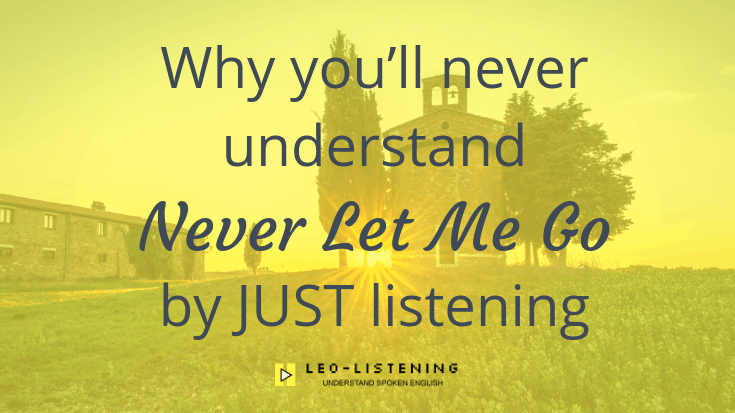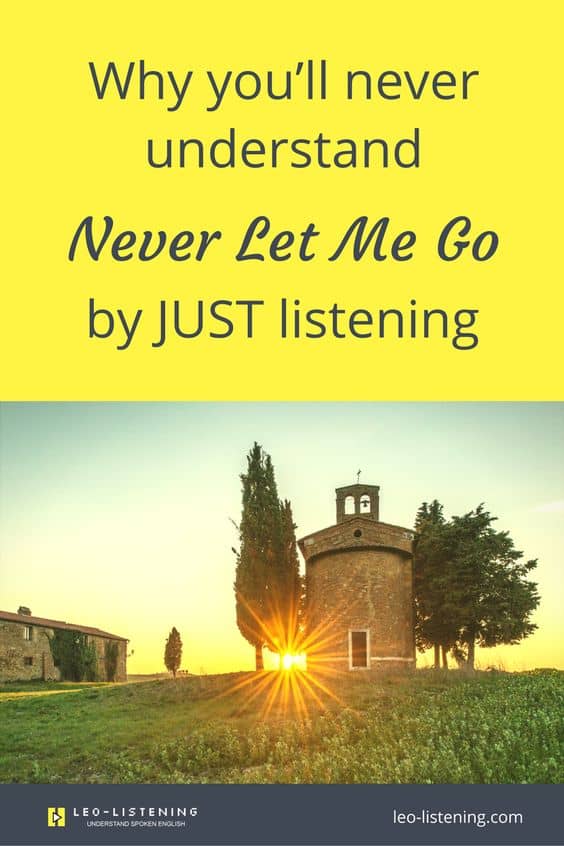
Recap
In the previous post, I started my series on watching the film “Never let me go” without the subtitles – that’s our ultimate goal. We talked about feeling good about the film, even if you have to watch it initially with subtitles.
It’s not your fault because I likened watching a film to being kicked out of a helicopter in the middle of nowhere and trying to find your way back to civilisation.
Movie dialogue is tough and very different to watching a TV series, where you know each week what’s going to happen, you’re familiar with the characters and the way they speak etc. A film is very different to that. It’s ok for that to be hard because there are ways to fix it.
Watch the video:
Listen to the post:
Why Just Listening To Movies Doesn’t Work
Here we’re focusing on why just listening is not a solution to understanding “Never let me go” or any film without the subtitles. If you want to just listen to films all day long and hope that one day the magic passive listening fairies will make you understand what you’re hearing, go and find another blog or story about someone who magically understood a language after doing loads of passive listening.
For other people who have a more realistic vision of how we actually understand films and spoken English in general, thank you! I’m glad you’re here and I can’t wait to help you!
If I had a Euro for every time someone said to me “I just need more practice and then I’ll understand”, I wouldn’t be a millionaire, but I’d have quite a lot of spare cash.
Trisha admitted in her blog post on books that it took her a good 10 years to really get comfortable with watching French TV. She also told me about her husband’s situation, and it’s taken him 15 years to stop watching movies or series in English without the subtitles. He’s French, he’s lived in the US, and his wife is a native speaker of English.
So if you’ve got a spare decade, go ahead! I wish you all the best, but it’s tough! Maybe some people are very good at picking things up with their ears. Some people seem to have that ability, but I interact with people who have very high levels of productive English.
This may seem a bit unusual because people may say “I understand everything, but I can’t speak!” I know people who can speak perfectly well or write amazing English. But they can’t understand some of the things that they hear.
It’s really frustrating, especially when the assumption is that your listening will always be ahead of your other skills. That’s not always true. It can change as you progress and it’s totally normal to struggle the most with the simplest, most basic words. That’s why it can be frustrating, but it’s totally normal.
4 Reasons Why Just Listening Doesn’t Work
In terms of just listening as a strategy, there are lots of problems. Here are a few of them:
- You don’t actually know what you’re struggling with. If you’re just listening and you only catch 50%, you haven’t taken the time to identify what the problem really is. If you don’t know what your problem is, how can you fix it?
- Just listening to entire 2-hour films is very time-consuming and tiring. We mentioned that last week. I said it’s absolutely fine to put the subtitles on, but of course that demands an extra effort from you because you’re reading and trying to watch the film at the same time.
- Just listening can work, and of course it has its place. I don’t make my students do only detailed listening. There is a place for passive listening. But if it’s the only strategy you use, it’s going to take a very long time.
- A big problem with films is how do you get the repetition? Who watches a film and then watches it again straight away, or even week after week? I have films that I love, but I don’t watch them every week. You’d have to be a really huge fan of the film to watch it that often.
You might pick particular scenes to watch again that make you laugh. And maybe you can find them on Youtube and watch them over and over again. But you can’t get the exposure that you need through just passive listening because you’re not listening multiple times.
It’s a bit different with TV series because they’re shorter and you might want to watch your favourite episode over and over. In any case you’re hearing the same characters, the same voices, the same topics from week to week, so it’s a bit easier. But with films, you watch one and then move on to the next one.
You could pick films with the same actors (I’ve recommended that as a strategy before), but passive listening by watching lots and lots of films – I think it’s going to take an awfully long time to see any progress.

What Should You Do To Improve Your English Listening Skills With Movies
So here’s what you should be doing instead of just listening or watching your favourite film 10 times a day.
The two things that you need to do any time you listen to anything that you can listen to again such as a TED talk, a presentation, a podcast, or whatever.
The first thing to do is diagnose the problem you’re having. And the second thing is to fix the problem.
Here we’re going to focus on how you diagnose the problem because that’s the first step. This is what I would recommend:
- Pick a scene with the lines that you find hard to catch. Just focus on one scene. Don’t go through the whole film.
- Choose some lines that were difficult within the scene. You need something that you can hold in your memory, so you only really want 5, 10 or 15 seconds. Don’t make it too long, or try to transcribe three minutes in one go.
- Play the line and then write what you hear. Don’t do this too many times – maybe three to five times maximum. There’s a limit to how many times you can repeat it without going crazy.
- Then compare what you wrote with the subtitles or transcript, or whatever written material you have. It’s really key to have something written to compare with what you write.
Then, as you’re comparing, you can notice what you missed, misheard, or couldn’t catch at all.
That way you’ll know what’s actually happening.
3 Common Movie Listening Problems
The second part is fixing the problem. How you’re going to fix the problem is going to depend on the problem. I’ve identified three things that usually come up for films.
- The thing that you missed is some kind of cultural reference, such as a reference to a book, another film, or a person from history. Or maybe it’s some kind of issue to do with the plot. Maybe they’re mentioning something that happened previously in the film.
If it’s that kind of issue, you can go and double check on Wikipedia, IMDB, Rotten Tomatoes, or go and check in the book. You could ask a native speaker if it’s something to do with American or British culture. This kind of problem is a reference issue so you need to go and check out what it means so that you can understand it.
- It could be that you missed, misheard or had some issue because there was a new word in the line that the actor or actress spoke, or a group of new words. Obviously this happens. This is not the core of all the problems to do with listening comprehension. But obviously new words can be an issue. So you need to look at the subtitles and try to guess the meaning from the context if you can.
Also you can ask yourself whether the word is really crucial to understanding the scene. Just because there are new words, it doesn’t mean you won’t understand and it doesn’t mean that you actually need them to know what’s going on. Don’t get too worried or upset about new words. They’re often not as big a deal as you think.
- This problem is the key and is the reason for a lot of issues. It’s that you didn’t hear or you misheard a word, or several words, that you already know due to the way that they sound in fast speech. This could be because of links between words or because sounds in words disappear.
To fix that problem, you can do something really practical. And that’s to find more examples of the issue, the link, or the disappearing word or sound, and train yourself to catch them.
Next Post In This Series
In my next video and blog post, I’m going to walk you through some typical difficulties in a dialogue and how to fix them.
Deseo entender peliculas en inglés